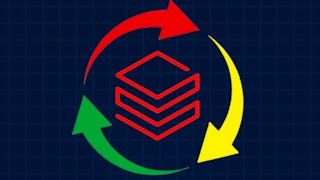What Is Data Communication? Basics to Know
April 3, 2025
Article



(39 reviews)
Recommended experience
Beginner level
Fundamentals of IT, business familiarity, data management understanding, and project management skills.
(39 reviews)
Recommended experience
Beginner level
Fundamentals of IT, business familiarity, data management understanding, and project management skills.
Roles and Responsibilities in Data Governance
Data Governance Framework
Security and Compliance in Data Governance

Add to your LinkedIn profile
3 assignments


Add this credential to your LinkedIn profile, resume, or CV
Share it on social media and in your performance review

Welcome to the Fundamentals of Data Governance course. This program will equip you with fundamental knowledge in data governance, enabling you to create and apply an all-encompassing framework for data governance that ensures data integrity, security, adherence to regulations, and proficient data handling in a company.
By completing this program, you will be able to: - Define and describe the concept of data governance, its core principles, and its role in managing and controlling an organization's data assets effectively. - Delve into the various data governance frameworks and models used in organizations. - Explore various tools and technologies available for supporting data governance initiatives. - Examine the advantages of data governance in the cloud and explore different cloud service providers for data governance. This short course is designed for Freshers, Data Professionals, Project Managers, Data Stewards, Quality Assurance Professionals, Legal and Compliance Officers, Executives and Managers, Database Administrators, and Business Analysts. Prior experience with AWS services like DataZone is beneficial but not mandatory. Embark on a learning adventure to excel in Data Governance, gaining proficiency in its essential principles, mastering best practices, and elevating your skills in effective data management strategies.
Welcome to the Fundamentals of Data Governance Course. This course will help you gain fundamental knowledge on data governance, which will make you capable of developing and implementing a comprehensive data governance framework to ensure data quality, security, compliance, and efficient data management within an organization. This course is beneficial to the freshers and data professionals who are looking to deepen their knowledge of Data Governance and apply it to real-life scenarios.
24 videos7 readings3 assignments4 discussion prompts
We asked all learners to give feedback on our instructors based on the quality of their teaching style.



Edureka is an online education platform focused on delivering high-quality learning to working professionals. We have the highest course completion rate in the industry and we strive to create an online ecosystem for our global learners to equip themselves with industry-relevant skills in today’s cutting edge technologies.

Whizlabs
Course

Board Infinity
Course

Sciences Po
Course

Course




39 reviews
56.41%
28.20%
7.69%
2.56%
5.12%
Showing 3 of 39
Reviewed on Jun 10, 2024
Excellent course! Very useful and thoroughly engaging!!
Reviewed on Apr 30, 2024
Presented in a very simple and easily digestible way - many great take aways to apply to my organization.
Reviewed on Feb 12, 2025
no need to have sessions about Data Governance tools, it was too much detail, looks like publicity

Unlimited access to 10,000+ world-class courses, hands-on projects, and job-ready certificate programs - all included in your subscription
Earn a degree from world-class universities - 100% online
Upskill your employees to excel in the digital economy
Data governance refers to the overall management of the availability, usability, integrity, and security of the data employed in an organization. It's a set of practices and processes which help to ensure that data is used efficiently and effectively to support business objectives. Key aspects of data governance include ensuring data quality, establishing data management policies, implementing data security and privacy, assigning data roles, and managing compliance and regulatory Requirements.
Data governance is crucial in the modern data-driven business environment, as it encompasses various practices that ensure the proper management and use of data. In essence, it is about having clear policies, procedures, and standards for handling data within an organization.
One of the primary reasons for its importance is the role of data in decision-making. Companies increasingly rely on data to make informed decisions, and the quality of these decisions is directly tied to the quality of the data. Data governance ensures that data is accurate, consistent, and reliable, thus fostering better decision-making.
Data governance is a comprehensive approach to managing the availability, usability, integrity, and security of the data in enterprise systems, based on internal data standards and policies that also control data usage. Effective data governance ensures that data is consistent and trustworthy and doesn't get misused. Here are the key components of data governance:
1. Data Quality: This involves ensuring that data is accurate, complete, and reliable. It involves processes and technologies for data cleansing, validation, and enrichment.
2. Data Stewardship: Data stewards are responsible for managing data assets. They ensure that the data governance policies are implemented and adhered to. They act as a bridge between the IT and business sides of an organization.
3. Policies and Standards: This includes developing and enforcing policies and procedures for data management. This can involve setting standards for data quality, data access, and data lifecycle management.
4. Data Privacy and Security: Ensuring that sensitive data is protected through encryption, access controls, and other security measures. Compliance with regulations like GDPR, HIPAA, or CCPA is critical in this aspect.
5. Regulatory Compliance and Reporting: Ensuring that data governance policies comply with relevant laws and regulations. This includes creating reports and documentation for regulatory bodies when necessary.
6. Audit and Monitoring: Regularly reviewing data governance practices to ensure compliance with policies and standards. This includes monitoring data access and usage.
Implementing data governance in an organization involves establishing policies, procedures, roles, and responsibilities to effectively manage and use data. It requires a comprehensive approach that encompasses various aspects of data management.
Here's a step-by-step guide to help you implement data governance in your organization:
1. Assess Your Current State
• Data Audit: Evaluate your current data assets, including their quality, security, and how they're being used.
• Compliance and Risk Assessment: Understand legal, regulatory, and business requirements for data handling in your industry.
2. Define Objectives and Scope
• Set Clear Goals: What do you want to achieve with data governance (e.g., compliance, data quality improvement, business decision-making)?
• Scope: Determine which data, departments, or processes will be under the governance program.
3. Develop a Data Governance Framework
• Policies and Standards: Establish rules for data management, quality, privacy, and security.
• Processes and Procedures: Define how data will be collected, stored, accessed, and used.
• Data Architecture: Ensure your data architecture supports governance objectives (e.g., data lineage, metadata management).
4. Establish a Data Governance Organization
• Governance Structure: Create a data governance committee and roles such as data stewards, data owners, and data custodians.
• Responsibility Assignment: Clarify roles and responsibilities for data governance tasks.
5. Implement Tools and Technology
• Data Management Tools: Invest in technology for data quality, metadata management, data cataloging, and data lineage.
• Security and Compliance Tools: Ensure tools for data security, privacy, and compliance are in place.
6. Develop Training and Communication Plans
• Awareness and Education: Conduct training sessions for staff on data governance policies and best practices.
• Communication Strategy: Regularly communicate the importance of data governance and updates on the program.
Access to lectures and assignments depends on your type of enrollment. If you take a course in audit mode, you will be able to see most course materials for free. To access graded assignments and to earn a Certificate, you will need to purchase the Certificate experience, during or after your audit. If you don't see the audit option:
The course may not offer an audit option. You can try a Free Trial instead, or apply for Financial Aid.
The course may offer 'Full Course, No Certificate' instead. This option lets you see all course materials, submit required assessments, and get a final grade. This also means that you will not be able to purchase a Certificate experience.
When you purchase a Certificate you get access to all course materials, including graded assignments. Upon completing the course, your electronic Certificate will be added to your Accomplishments page - from there, you can print your Certificate or add it to your LinkedIn profile. If you only want to read and view the course content, you can audit the course for free.
You will be eligible for a full refund until two weeks after your payment date, or (for courses that have just launched) until two weeks after the first session of the course begins, whichever is later. You cannot receive a refund once you’ve earned a Course Certificate, even if you complete the course within the two-week refund period. See our full refund policy.
Yes. In select learning programs, you can apply for financial aid or a scholarship if you can’t afford the enrollment fee. If fin aid or scholarship is available for your learning program selection, you’ll find a link to apply on the description page.
Financial aid available,